Framingham Heart Study Celebrates 75 Years of Research with Open House
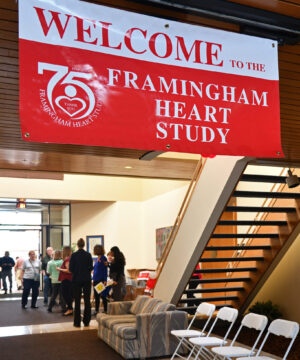
In 1948, the first of 15,000 volunteer participants entered the research center of the historic Framingham Heart Study (FHS) to have their vitals taken and other tests performed that would provide scientist with the facts they needed to fight heart disease and cardiovascular-related conditions like stroke and Alzheimer’s disease.
While the last person in the first cohort of over 5,000 volunteers who signed on in 1948 passed away at 105 earlier this year, participation was passed down generationally through families over time. On Wednesday, Oct. 25, nearly 300 participants and their guests visited the research center. They took tours covering eight distinct research areas with 20 principal investigators in research teams grouped together to cover a common theme, like neurology and cardiology.
Over 40 research staff plus volunteers, including former FHS staff, were on hand to help and participants conversed with researchers whose work they’d profoundly influenced, and with FHS staff who had known them for years or, in many cases, for decades.
Appreciation went both ways.
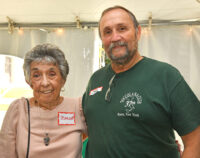
“My mother, my brother, my aunts, my first cousins,” said Joanne Barber, 74, ticking off the generations of her family that have participated in the study from 1948 to today.
“I’m just honored to be a part of it, with my father, my grandfather, my seven brothers,” said John Villa, 69, who has lived in Framingham his whole life. “I think it’s great to help to find cures for all our ailments. The big ones. Nice to be a part of giving back to society.”
George O’Connor, MD, interim FHS co-director, said the generational record of participation for 75 years is unique in medical research. A professor of medicine at the Chobanian & Avedisian School of Medicine which oversees the study, O’Connor has been a principal investigator at FHS for 31 years. He said the loyalty of participants over such a long period of time has created unforeseen research options.
“It gives you a wealth of opportunities,” he said. Along with the clinical data on health conditions, they also have longitudinal measures of pulmonary function, electrocardiograms, blood lipids, genetics and other data that helps deepen the understanding of what is going on in the human body over time and over generations.
“It’s just a remarkable achievement,” said O’Connor.
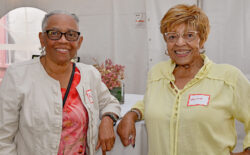
Ruby Bishop and Anita Beckett were among the first Black participants as the study broadened its participant base from exclusively white European families to include Black, Hispanic, and Asian American families in the 1990s.
“I thought it would be a good thing,” said Bishop. “There are little nuances brought on by our genetic makeup and our environment.”
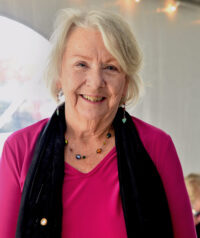
“I really wanted to be in on the celebration,” said Donna Boundy, 73, who drove over three hours from her home in Woodstock, New York, to attend, as she has done every three years for most of her life as a participant. Her mother and father were in the original cohort. She was looking forward to talking to researchers.
“I have no idea what study they’re using (my information) for,” Boundy said. “I do it because it meant a lot to my father. It meant a lot to them; they were proud of it.”
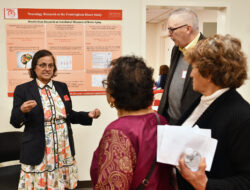
Researchers also traveled long distances to attend the celebration. Neurologist Sudha Seshadri, MD, a senior FHS investigator and founding director of the University of Texas San Antonio Glenn Biggs Institute for Alzheimer’s & Neurodegenerative Diseases, came from San Antonio with her husband Vasan Ramachandran, MD, the former longtime FHS director and now founding dean of the University of Texas School of Public Health at San Antonio. For most of the day, they explained to participants how their data was being used in research.
“I had to be here. It’s now 30 years since I started working with the heart study,” said Seshadri. “This is my life’s work, just as it is for participants.”
See more on Facebook.